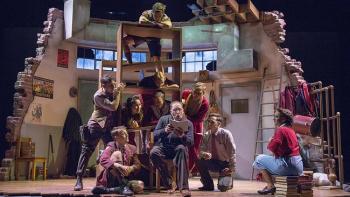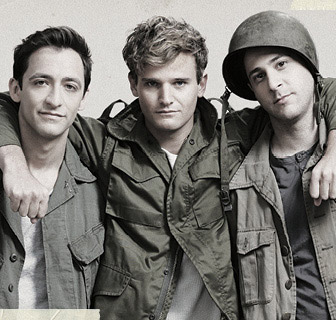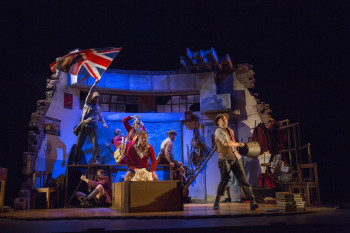Review: Henry V – Sydney Season
Bell Shakespeare has been touring Henry V through Australia since the early parts of the year, and it has arrived to finish its season in Sydney, its reputation preceding it steadily like a drumbeat: steady, and very sure. Expectations were very high for this production – and they were met.
More than met.

The premise of this production is inspired by a true story: a vicar ran a bomb shelter during the Luftwaffe Blitz of London in 1940, and it turned into a theatre – the Boys’ Club, a group of students sheltering there, started performing plays and cabarets to cheer up their fellow sheltees. School spaces were commonly used for shelter, and so in director Damian Ryan’s take on the play, we are in a schoolroom, with a schoolmaster, keeping his students and his refugees focused on the Bard, building a narrative out of the politics of the history play, using his chalkboard to explain the complicated allegiances and lineages, keeping spirits up and minds active.
A history of invasion and war, backdropped by air strikes, blackouts, and uncertainty. It’s a brilliant idea. Ryan’s production brings it all to such vivid life. We see brief glimpses of their first few plays – Richard II, Henry IV – through shells, sirens, terror, and laughter. We are getting settled into the world.
And then we alight on the next history play, and our journey in this production, Henry V. Prince Hal, now a young king, stands a little taller now he has this power, this score to settle – this question, should he invade France, make a claim for the country he is entitled to make? His shoulders square, his face becomes more drawn, serious. He takes his role of sending his men to war so seriously, and this play, the great war play, once more to the breach and we happy few, we band of brothers, and he will strip his sleeve and show his scars and say ‘These wounds I had on Crispin’s day’, is so relevant to be painful.

Is it right to die for king and country? Is this a worthwhile fight? Are these students, wounded and dying in in their shelter as the show goes on, as the adage says and so it must, able to find some kind of justification for their losses and fear in a prince who fought alongside men and worried about their sacrifice?
The answer is, of course, not quite. There are no answers here, and Ryan doesn’t try to tell us what he thinks of war and right and wrong and death in the name of a country or an ideal. Nothing in the text can solve these problems, these deep aches of the spirit and the heart, but it does give that beautiful Shakespearean gift of universality, of recognition. Of humanity in the tough decisions, in the shared experience of death and dying and danger; Henry V gives voice to fears and rages and unfathomable life at its most extreme and challenging.
It’s a beautifully collaborative effort; the ensemble sings, a tight-knit unit at the end of a long run that anticipates each other and plays against each other like a dance of effortless partnering. They shift roles to read their various parts, with the exception of our Harry (Michael Sheasby), becoming more and more complex performers as we burrow into the play.
The schoolroom turned bunker is the play’s makeshift set (design by Anna Gardiner), and the adolescent ingenuity in re-purposing some newspapers and bookcases rings very true, while giving us a burst of theatre magic.
The shells don’t stop when the play gets going. The danger doesn’t cease. The ever-present reminder of the unrest outside the room creates a sense of moving urgency, of real, real stakes, this hope that the war stays in the pages of the play and doesn’t erupt into the room.

There is such a sense of empathy in this production. A bond between these students in the shelter, a struggle to understand old kings who once were young, a striving to rise above violence and despair. A laugh, here and there, in the sense of play that comes with putting on a play. Tears, and dust, and something you sense is authentic in the emotions playing across all these faces. These happy few.
The schoolteacher (Keith Aguis) is our Chorus, who is our guide into this play – one of the most eloquent narrators on stage – and this, later, becomes deeply affecting. He is the anchor by which we enter the concept of this production, and how we see these students.
Matthew Backer is a delightfully haughty Dauphin, among others, a light in the (at times literal) darkness, Eloise Winestock is a charming Princess Katherine who possesses a real personality, thank goodness, but it is the haunted King, Sheasby, that carries the weight of this war and all wars on his shoulders, and he does it seriously, thoughtfully, gamely. If Agius is the anchor, Sheasby is the soul.
They are just kids, and they are not. They are forever changed, and they are not. They are people, in the hardest place, and the words aren’t a guide, just a companion, but it’s a companion sorely needed.
This is an excellent production that has embraced the scrappy valor and quiet contemplation of Henry V, and it was well worth the wait.

